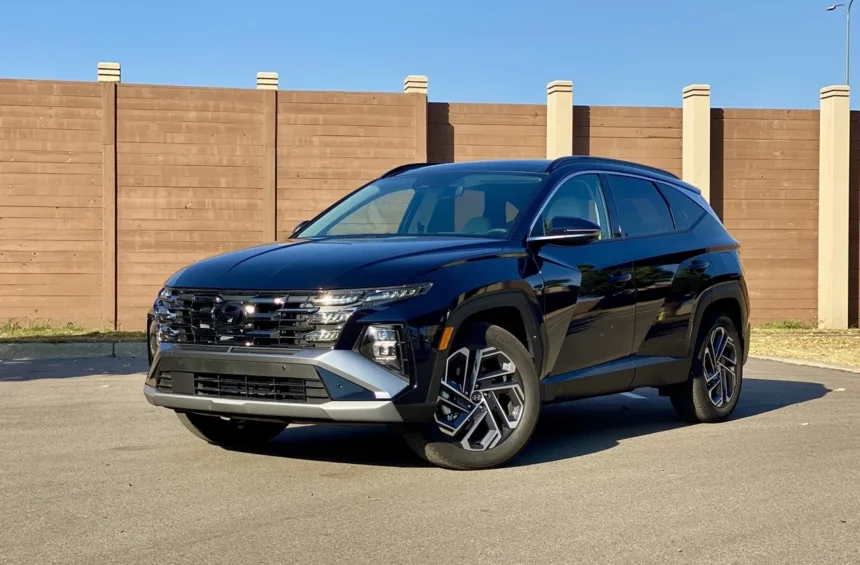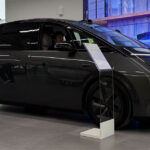The 2025 Hyundai Tucson Hybrid is making waves in the compact crossover market with its updated features and performance. As a direct competitor to the popular Toyota RAV4 Hybrid, the Tucson Hybrid offers a compelling option for buyers looking for a stylish and efficient vehicle.
One of the standout features of the Tucson Hybrid is its smart interior design. The top Limited trim model comes with a revamped interior that includes a tiered cargo shelf, a digital climate interface with haptic feedback, and a curved 12.3-inch touchscreen display. The cabin is optimized for space and comfort, with luxurious materials and a well-thought-out layout. The addition of wireless smartphone connectivity and a convenient dash shelf make the Tucson Hybrid a practical choice for modern drivers.
In terms of performance, the Tucson Hybrid stands out with its quiet refinement and impressive fuel efficiency. The top Limited trim model comes with acoustic laminated front glass to reduce road and wind noise, creating a serene driving experience. The Baby Mode feature smooths out acceleration and shifts, further enhancing the comfort of the ride. With an EPA rating of 35 mpg combined, the Tucson Hybrid offers above-average fuel efficiency for an all-wheel-drive crossover.
The Tucson Hybrid also features dual-mode paddle shifters that allow drivers to adjust regenerative braking levels and switch between driving modes. In Sport mode, the paddle shifters act as gear shifters for the 6-speed automatic transmission, providing a more engaging driving experience. The combination of a 1.6-liter direct-injected inline-4 engine and a 47.7-kw electric motor delivers a total of 231 hp and 258 lb-ft of torque, making the Tucson Hybrid quick and responsive on the road.
While the Tucson Hybrid offers many benefits, some drivers may need time to adjust to its 6-speed automatic transmission. Unlike the Toyota RAV4 Hybrid’s more complex transmission system, the Tucson Hybrid uses a single motor setup, which may require a different driving approach.
Overall, the 2025 Hyundai Tucson Hybrid is a strong contender in the compact crossover segment, offering a blend of style, comfort, and performance. With its updated features and efficient hybrid powertrain, the Tucson Hybrid is definitely worth considering for buyers looking for a reliable and practical vehicle. When it comes to hybrid SUVs, the Toyota system is known for its efficiency, while the Tucson leans more towards power. The RAV4 Hybrid boasts 219 hp and 221 lb-ft of torque, making it a strong contender in the hybrid market. On the other hand, the Tucson offers a more conventional driving experience with its 6-speed automatic transmission. However, the Tucson surprises hybrid drivers with its ability to shift into electric mode, a feature that may take some getting used to for those accustomed to Toyota’s system.
One of the standout features of the Tucson is its spacious interior. Compact crossovers often struggle to provide ample room for passengers and cargo, but the Tucson manages to strike a balance. With a long 105.1-inch wheelbase, the Tucson offers a generous 41.3 inches of rear legroom, making it a comfortable option for rear-seat passengers. Additionally, the Tucson’s 41.2 cubic feet of cargo space behind the rear seats gives it an edge over competitors like the CR-V Hybrid and the RAV4 Hybrid.
Despite Toyota’s dominance in the hybrid market, Hyundai is making waves with the Tucson Hybrid. A quarter of Tucson sales are for the hybrid model, indicating a growing interest in Hyundai’s electrified offerings. With its roomy interior and impressive hybrid performance, the Tucson is a compelling choice for families looking to go green.
The 2025 Hyundai Tucson Hybrid Limited AWD offers a blend of power and efficiency, with a 1.6-liter inline-4 engine paired with a 64-hp motor for a total output of 231 hp and 258 lb-ft of torque. The all-wheel drive system ensures excellent traction in various driving conditions. With EPA fuel economy ratings of 35 mpg in the city, on the highway, and combined, the Tucson Hybrid delivers respectable efficiency.
In conclusion, the Hyundai Tucson Hybrid is a strong contender in the hybrid SUV market, offering a balance of power, efficiency, and spaciousness. With its innovative features and growing popularity, the Tucson is a top choice for families looking to embrace electrification. The field of artificial intelligence (AI) is rapidly evolving, with new breakthroughs and advancements being made on a regular basis. One of the latest developments in AI is the use of deep learning algorithms to improve the accuracy and efficiency of AI systems.
Deep learning is a type of machine learning that uses neural networks to process and analyze data. These neural networks are composed of multiple layers of interconnected nodes, which are used to extract features from the input data and make predictions based on these features.
One of the key advantages of deep learning algorithms is their ability to automatically learn and adapt to new data without the need for explicit programming. This makes them ideal for tasks such as image and speech recognition, natural language processing, and autonomous driving.
In recent years, researchers have been exploring ways to improve the performance of deep learning algorithms by increasing the depth and complexity of the neural networks. This has led to the development of new architectures such as convolutional neural networks (CNNs) and recurrent neural networks (RNNs), which have been shown to achieve state-of-the-art results in a wide range of applications.
For example, CNNs have been used to significantly improve the accuracy of image recognition systems, while RNNs have been used to generate realistic text and speech. These advancements have paved the way for the development of more sophisticated AI systems that can perform complex tasks with human-like accuracy.
In addition to improving the performance of AI systems, deep learning algorithms have also been used to reduce the amount of manual intervention required to train and optimize these systems. This has made it easier for researchers and developers to experiment with new ideas and algorithms, leading to faster innovation and progress in the field of AI.
Overall, the use of deep learning algorithms has revolutionized the field of artificial intelligence, enabling the development of more powerful and efficient AI systems than ever before. As researchers continue to explore new ideas and techniques, we can expect to see even more exciting advancements in the field of AI in the years to come.







